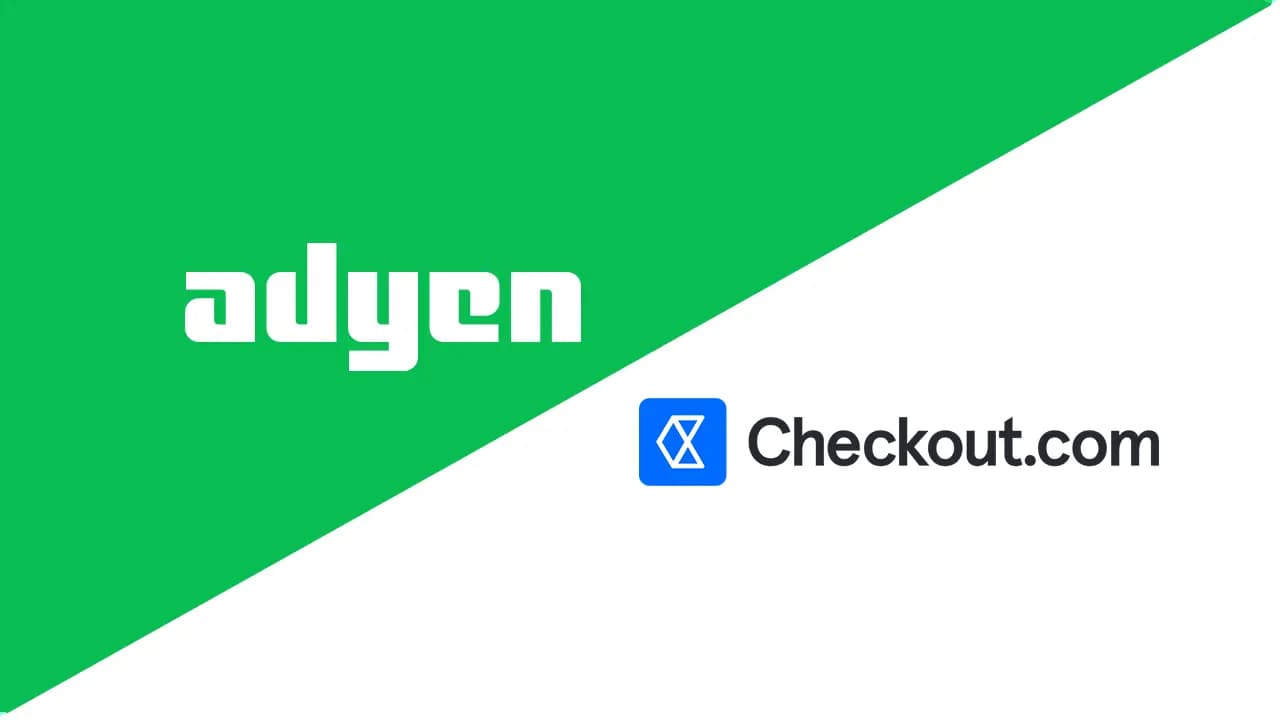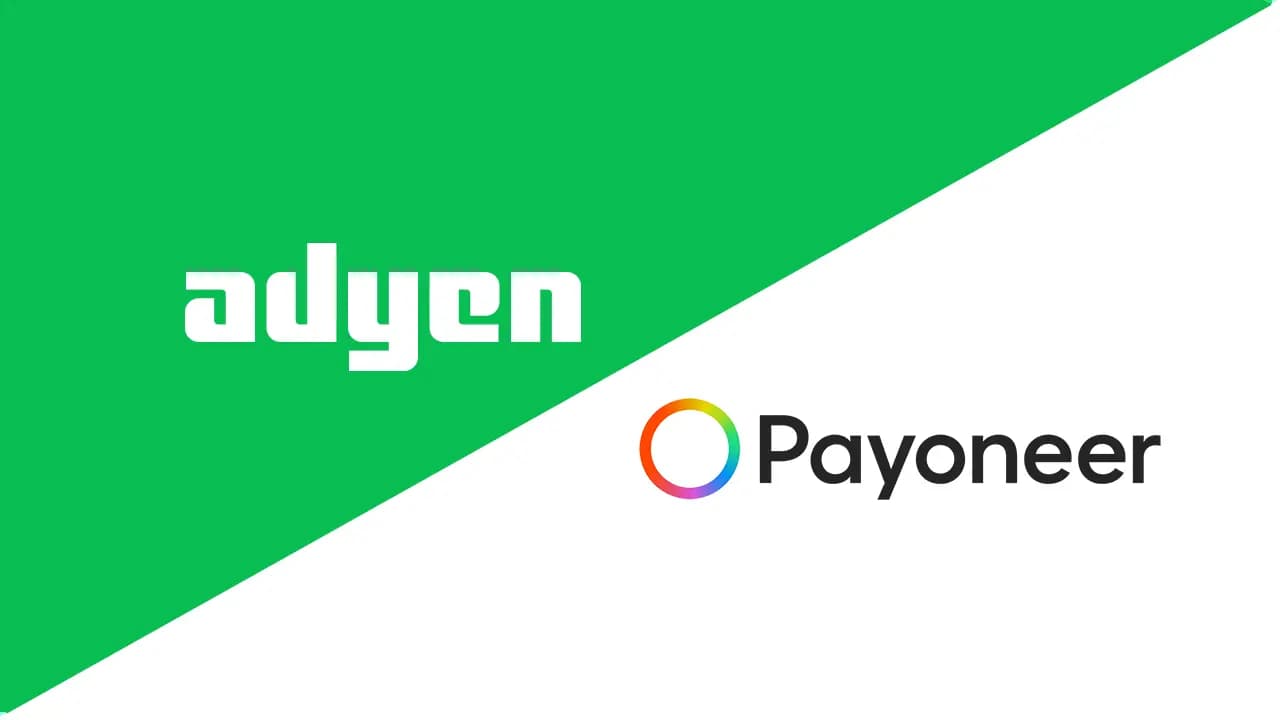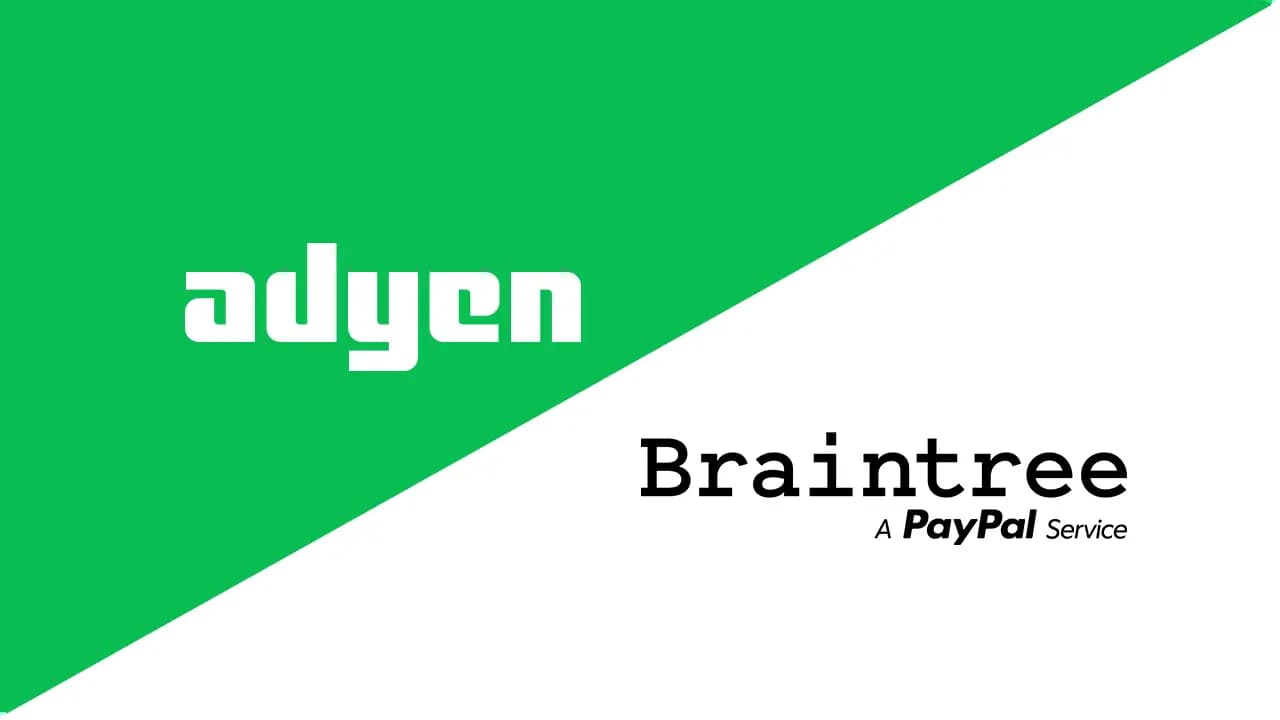
Square vs. Adyen: A Comprehensive Comparison
Choosing the Right Payment Processing Strategy for Your Business
When selecting a payment processing solution, the choice between Square and Adyen represents a fundamental decision about your business size, complexity, and growth trajectory. Square offers the simplicity of flat-rate pricing with an integrated business ecosystem perfect for small to medium businesses, while Adyen provides enterprise-grade payment solutions designed for large-scale global operations. This decision shapes not just your payment processing costs, but your entire operational infrastructure and international expansion capabilities. Square dominates with 4 million sellers processing $228 billion annually through its comprehensive business management platform, while Adyen processed over €1.28 trillion ($1.35 trillion USD) in 2024, serving major global enterprises with complex payment needs.
Key Takeaways
- Target Market: Square focuses on small to medium businesses with simple needs, while Adyen specifically targets large enterprises and global businesses with complex requirements
- Pricing Philosophy: Square uses flat-rate percentage fees ideal for predictable costs, while Adyen employs interchange-plus-plus pricing better suited for high-volume operations
- Geographic Reach: Square operates in 8 countries, while Adyen operates in over 45 markets with 150+ currencies and 250+ payment methods
- Setup Complexity: Square offers instant setup with no technical expertise required, while Adyen requires detailed onboarding and may take up to 4 business days for approval
- Market Position: Square leads in small business adoption with proven simplicity, while Adyen serves major global brands like Spotify, Uber, and eBay
Payment Solution Type Overview
Modern payment processors can be categorized into two distinct approaches based on their target markets and operational complexity.
Small Business-Focused Processors combine payment processing with comprehensive business management tools using traditional flat-rate pricing. These platforms prioritize simplicity, quick onboarding, and integrated features that help small businesses manage all aspects of their operations from a single dashboard.
Enterprise Payment Processors focus on providing scalable, global payment processing solutions for large organizations with complex needs. These platforms emphasize advanced integrations, multi-market capabilities, sophisticated fraud prevention, and customizable solutions for international operations.
Square Overview
Square is a point-of-sale system for sellers with physical or online stores, launched in 2009 by Block, Inc., enabling merchants to accept card payments and manage business operations. As of 2024, Square is the U.S. market leader in point-of-sale systems, serving 4 million sellers and processing $228 billion annually.
What Is Square?
Square revolutionized small business payments by making card acceptance accessible through simple mobile card readers and comprehensive business management software. Beyond payment processing, Square has evolved into a complete business ecosystem offering inventory management, staff scheduling, customer relationship tools, and banking services. The platform’s strength lies in its ability to serve businesses of all sizes with transparent, predictable pricing and no long-term contracts.
How Does Square Work?
Square operates through an integrated ecosystem that combines payment processing with comprehensive business management tools. When customers make payments, Square’s system handles secure transaction processing, provides real-time reporting, and automatically updates inventory and sales data. The platform’s simplicity allows businesses to start accepting payments immediately with minimal setup requirements.
Square’s approach centers on removing complexity from business operations by providing everything needed to run a business in one integrated platform, from payment acceptance to payroll management and financial services.
Square Features and Pricing
Square’s Features
- Complete POS system with in-person payments at 2.6% + 15¢
- Online payment processing at 2.9% + 30¢ per transaction
- Integrated inventory management and customer relationship tools
- Staff management with scheduling and payroll integration
- Banking services through Square Banking
- Free mobile app and basic POS software
- No hidden fees or long-term contracts
Square’s Pricing
- Free basic plan with no monthly fees
- Plus Plan: $89/month with discounted processing fees
- Premium Plan: Custom pricing for high-volume businesses
Square’s Transaction Fees
- In-person payments: 2.6% + 15¢
- Online payments: 2.9% + 30¢
- Manually entered payments: 3.5% + 15¢
- Invoices: 3.3% + 30¢ for cards, 1% minimum $1 for ACH
- No chargeback fees
Square’s Strengths and Weaknesses
Strengths of Square
- Instant Setup: Easy setup with immediate activation for small businesses
- Comprehensive Platform: All-in-one solution with integrated business management tools
- No Monthly Fees: Free basic plan makes it accessible for new businesses
- Hardware Ecosystem: Own ecosystem of POS hardware and free POS software
- Transparent Pricing: Simple 1.75% per in-person transaction with no surprise add-ons
- Market Leader: Proven track record serving 4 million sellers
Weaknesses of Square
- Limited Geographic Reach: Available in only 8 countries compared to global alternatives
- Higher Costs for Volume: Flat-rate pricing becomes expensive as volumes increase
- Basic Enterprise Features: Less depth for enterprise-level requirements
- Currency Limitations: Supports around six major currencies, always settles in seller’s local currency
Who Benefits the Most From Square?
Square Is Best For
- Small to Medium Businesses: Companies needing quick, simple payment acceptance with integrated business tools
- Local Operations: Local retailers, cafes, and small service businesses
- New Businesses: Startups requiring immediate setup with no monthly fees
- Simple Requirements: Businesses preferring bundled hardware and quick setup
- Domestic Focus: Operations primarily serving domestic markets
Ideal Use Cases For Square
- Pop-up shops and mobile vendors requiring portable payment solutions
- Restaurants and food service businesses needing comprehensive POS functionality
- Retail stores requiring integrated inventory and customer management
- Service-based businesses needing appointment booking and staff scheduling
- Businesses wanting comprehensive financial services including business banking
Adyen Overview
Adyen is a Netherlands-based global payment processing company that provides end-to-end payment solutions for enterprises with complex international payment needs. Founded in 2006, Adyen processed over €1.28 trillion ($1.35 trillion USD) in 2024, serving major global brands with sophisticated payment infrastructure requirements.
What Is Adyen?
Adyen is an end-to-end payment processing platform designed for businesses that demand efficiency, scalability, and global reach. Unlike traditional payment processors that rely on third-party acquiring banks, Adyen is a direct acquirer, meaning it owns the entire payment stack. The platform specializes in unified commerce, connecting online, in-store, and in-app payments into one system while providing extensive global payment method support and advanced fraud prevention.
How Does Adyen Work?
Adyen operates through a single platform that connects directly to local card networks and payment methods, removing the need for third-party processors. The system processes payments across multiple channels and currencies while providing comprehensive data insights and fraud prevention. Adyen’s unique data ecosystem reveals opportunities for business growth, coupled with machine learning technology to protect against fraud.
The platform’s strength lies in its ability to handle complex, high-volume operations across multiple markets with local acquiring capabilities and extensive payment method support.
Adyen Features and Pricing
Adyen Features
- Interchange++ pricing model with transparent fee breakdown
- Support for 250+ payment methods across 150+ currencies
- Direct acquiring in over 45 markets
- Advanced fraud prevention with RevenueProtect
- Unified commerce connecting online, in-store, and in-app payments
- Enterprise-grade payment terminals and custom setups
- Comprehensive reporting and analytics
- Multi-currency settlement options
Adyen Pricing
- Pay per transaction with no setup or monthly fees
- $0.12 processing fee plus payment method-specific fees
- Interchange++ pricing passes interchange fees directly with transparency
- Minimum invoice requirements depending on industry or business model
- Custom pricing for high-volume merchants
Adyen Transaction Fees
- Fixed processing fee of $0.12 plus payment method fee
- Interchange++ model with transparent fee breakdown
- Chargeback fees between $5-100 per chargeback
- No monthly subscription fees
Adyen’s Strengths and Weaknesses
Strengths of Adyen
- Global Reach: Operations in over 45 markets with 250+ payment methods
- Direct Acquiring: Owns entire payment stack, reducing third-party dependencies
- Unified Commerce: Connects online, in-store, and in-app payments in one system
- Advanced Fraud Prevention: Machine learning-based fraud prevention tools
- Enterprise Features: Advanced compliance controls and enterprise-grade security
- Transparent Pricing: Interchange++ model provides cost breakdown transparency
Weaknesses of Adyen
- Complex Onboarding: Application process usually takes around four business days
- Enterprise Focus: Not ideal for small businesses due to complexity and requirements
- No Self-Service: Requires lengthy discussions with sales representatives
- Technical Requirements: Likely need developer resources to take full advantage of API
- Hardware Costs: Hardware pricing requires quotes and custom setups
Who Benefits the Most From Adyen?
Adyen Is Best For
- Large Enterprises: Global enterprises handling complex payment needs and large transaction volumes
- International Operations: Businesses operating across multiple countries requiring local acquiring
- High-Volume Merchants: Companies that can take advantage of interchange++ pricing structure
- Omnichannel Businesses: Retailers needing unified online, in-store, and in-app payment data
- Complex Requirements: Organizations needing advanced fraud prevention and custom integrations
Ideal Use Cases For Adyen
- Global e-commerce platforms requiring multiple payment methods and currencies
- Large retail chains with unified commerce needs across channels
- Enterprise marketplaces facilitating complex payment flows
- International subscription services requiring global payment method support
- Major brands requiring advanced fraud prevention and risk management
Financial & Market Insights
Market Position: Square processed $228 billion in payments during 2024, maintaining its position as the U.S. market leader in point-of-sale systems serving 4 million sellers. Block (Square’s parent company) was added to the S&P 500 in July 2025, highlighting its maturation as a major financial services provider.
Adyen achieved remarkable growth in 2024, processing over €1.28 trillion ($1.35 trillion USD) with a 33% year-over-year increase. The company reported net revenue of €1.996 billion ($2.1 billion USD), up 23% from 2023, demonstrating strong performance in the enterprise payment processing market.
Growth Trajectories: Square continues expanding its ecosystem with new financial services while maintaining its core focus on small business empowerment. Square’s GPV reached $210 billion in 2025 with continued growth in integrated business services.
Adyen’s point-of-sale segment showed exceptional growth with volumes reaching €232.7 billion, a 46% year-over-year increase. The company maintains strong profitability with EBITDA of €992.3 million and a 50% margin.
Investment and Innovation: Both companies continue significant technology investment. Square focuses on comprehensive business solutions and domestic market penetration, while Adyen invests heavily in global expansion and advanced payment intelligence. Adyen’s platform intelligence improves with scale, having surpassed the 1 trillion EUR mark of global payments transactions processed in 2024.
Feature Comparison
| Feature | Square | Adyen |
|---|---|---|
| Billing & Invoicing | ✅ | ✅ |
| Currency Support | ✅ | ✅ |
| Customizable Branding/White Label | ⚠️ | ✅ |
| Deployment Options | ✅ | ✅ |
| Fraud Prevention Tools | ✅ | ✅ |
| Integration Capabilities | ✅ | ✅ |
| Management Tools | ✅ | ✅ |
| Payment Types Support | ✅ | ✅ |
| Reconciliation Tools | ✅ | ✅ |
| Reporting & Data Analysis | ✅ | ✅ |
| Security/Compliance | ✅ | ✅ |
| Smart Routing | ✅ | ✅ |
| Split Payments | ✅ | ⚠️ |
| Supported Payment Methods | ✅ | ✅ |
| Tokenization | ✅ | ✅ |
| Vaulting | ✅ | ⚠️ |
Final Summary & Recommendation
Key Reasons to Choose Square
- Your business is small to medium-sized and needs simple, predictable pricing
- You want instant setup with no technical complexity or lengthy approval processes
- You operate primarily in domestic markets (especially North America)
- You need an all-in-one solution with integrated POS hardware and business tools
- You prefer flat-rate pricing without worrying about interchange fluctuations
- You want no monthly fees and transparent, simple fee structures
Key Reasons to Choose Adyen
- Your business is a large enterprise processing significant transaction volumes
- You operate internationally and need support for multiple currencies and payment methods
- You require advanced fraud prevention and enterprise-grade security features
- You want unified commerce capabilities connecting all payment channels
- You can benefit from interchange++ pricing transparency and potential cost savings
- You have technical resources to implement and optimize complex payment solutions
The Bottom Line: The choice between Square and Adyen is largely determined by business size, complexity, and geographic scope. Square excels for small to medium businesses seeking simplicity, immediate setup, and comprehensive business management tools with predictable flat-rate pricing. Adyen provides superior solutions for large enterprises requiring global reach, advanced features, complex integrations, and the scale to benefit from interchange++ pricing.
Square’s flat-rate pricing and bundled approach make it ideal for local businesses, while Adyen’s global capabilities and enterprise-grade features serve major international operations. Consider your transaction volume, geographic requirements, technical capabilities, and growth trajectory when making your decision. Most small businesses will find Square’s simplicity and immediate setup more valuable, while enterprises with complex global needs will benefit from Adyen’s sophisticated platform and extensive capabilities.
This comparison is based on publicly available information as of September 2025. Pricing and features may vary based on specific business requirements and negotiations with each provider.





